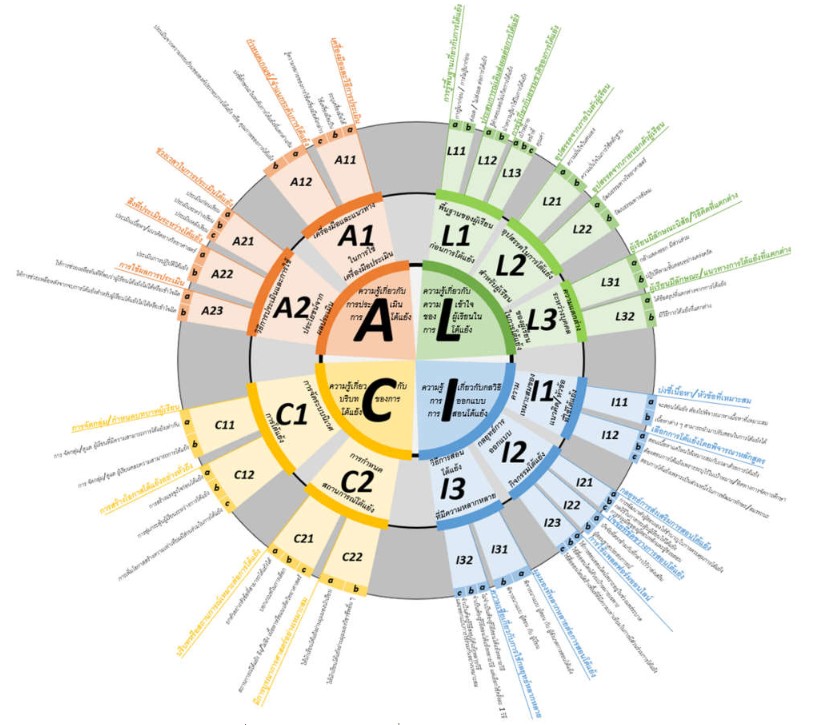ถอดบทเรียนจากมุมมองนิสิตครูวิทยาศาสตร์เกี่ยวกับความรู้ผสานวิธีสอนการโต้แย้งในเนื้อหาวิชาเฉพาะ
Main Article Content
บทคัดย่อ
มุมมองของนิสิตครูวิทยาศาสตร์กลายเป็นกุญแจสำคัญที่เชื่อมต่อความรู้ ความเชื่อ สู่การฝึกฝน ในการปฏิบัติการสอนโต้แย้ง ที่เป็นหนึ่งในเป้าหมายของรายวิชาแนวปฏิบัติวิทยาศาสตร์และวิศวกรรมศาสตร์ อีกทั้งยังสะท้อนสู่การออกแบบกลยุทธ์เพื่อยกระดับการจัดกิจกรรมการเรียนรู้ที่มุ่งเน้นการวิพากษ์ในชั้นเรียนสำหรับนิสิตครูวิทยาศาสตร์ งานวิจัยเชิงสำรวจครั้งนี้ มีวัตถุประสงค์เพื่อสำรวจมุมมองของนิสิตครูวิทยาศาสตร์เกี่ยวกับความรู้ผสานวิธีสอนการโต้แย้งในเนื้อหาวิชาเฉพาะ จำนวน 5 คน ของมหาวิทยาลัยแห่งหนึ่งในกรุงเทพมหานคร หลังผ่านการสอนจุลภาคซึ่งมุ่งเน้นการพัฒนาแนวปฏิบัติโต้แย้งให้ผู้เรียน โดยใช้แบบสัมภาษณ์กึ่งโครงสร้างที่มีข้อคำถามครอบคลุมความรู้เกี่ยวกับ ผู้เรียน กลวิธีการสอน บริบท และ การประเมิน การโต้แย้ง แล้ววิเคราะห์ข้อมูลเชิงเนื้อหาจากจากแบบสัมภาษณ์ ผลการวิจัยจากประเด็นย่อยแสดงให้เห็นว่า นิสิตครูวิทยาศาสตร์มีมุมมองเกี่ยวกับ ความต่างในการสอนโต้แย้ง 5 ด้าน คือ ประเด็นที่สร้างความคิดต่าง ผู้เรียนมีความต่าง ผู้เรียนมีลักษณะการโต้แย้งที่ต่าง กลยุทธ์ในการสอนที่ต่าง และ ข้อสรุปจากการโต้แย้งที่ต่าง อีกทั้งยังสร้างองค์ความรู้ด้วยตนเองในการระบุลักษณะสำคัญที่ใช้กำหนดสถานการณ์ในการโต้แย้งไว้ 3 ประการ คือ ภาพนิ่ง ภาพหลายมุม และ ภาพพร้อมกรอบ การถอดบทเรียนผ่านมุมมองนิสิตครูหลังการสอนจุลภาพนั้น ช่วยผลักดันและเชื่อมต่อให้พวกเขาค้นพบความหมายและเหตุผลเบื้องหลังการกระทำ และสอดคล้องกับวัตถุประสงค์ในการปฏิบัติการสอนอย่างไร ทั้งนี้กรอบแนวคิดของความรู้ผสานวิธีสอนการปฏิบัติโต้แย้งยังเป็นฐาน ให้กับการศึกษาออกแบบโปรแกรมหรือกำหนดกลยุทธ์เพื่อพัฒนานิสิตครูวิทยาศาสตร์ให้สามารถสอนแนวปฏิบัติอื่น ๆ ร่วมกับแนวปฏิบัติโต้แย้งได้สมบูรณ์ขึ้น
Article Details

อนุญาตภายใต้เงื่อนไข Creative Commons Attribution-NonCommercial-NoDerivatives 4.0 International License.
เอกสารอ้างอิง
Baxter, P. & Jack, S. (2008). Qualitative case study methodology: Study design and implementation for novice researchers. The Qualitative Report, 13(4), 544–559.
Bernard, H., & Ryan, G. (2010). Analyzing qualitative data: Systematic approaches. Sage Publications.
Berland, L. & Reiser, B. (2009). Making sense of argumentation and explanation. Science Education, 93(1), 26-55.
Bogar, Y. (2019). Synthesis Study on Argumentation in Science Education. International Education Studies. 12(1).
Bybee, R. W. (2014). The Case for STEM Education: Challenges and Opportunities. NSTA Press.
Chen, Y.-C., & Terada, T. (2021). Development and validation of an observation-based protocol to measure the eight scientific practices of the next generation science standards in K-12 science classrooms. Journal of Research in Science Teaching, 58(10), 1–38.
Choi, A., Seung, E. & Kim, D. (2021). Science Teachers’ Views of Argument in Scientific Inquiry and Argument-Based Science Instruction. Research in Science Education, 51, 251–268.
Christian, K. B., Kelly, A. M. & Bugallo, M.F. (2021). NGSS-based teacher professional development to implement engineering practices in STEM instruction. International Journal of STEM Education, 8(21).
Cunningham, C. M., & Kelly, G. J. (2017). Epistemic practices of engineering for education. Science Education, 101(3), 486-505.
English, L. D. (2016). STEM education K-12: perspectives on integration. International Journal of STEM Education, 3(1), 3.
Gess-Newsome, J. (2015). A model of teacher professional knowledge and skill including PCK: Results of the thinking from the PCK summit. In A. Berry, P. Friedrichsen, and J. Loughran. (eds.) Re-examining Pedagogical Content Knowledge in Science Education. New York: Routledge, 38–52.
Hanuscin, D. L., M. H. Lee, and V. L. Akerson. (2011). Elementary teachers' pedagogical content knowledge for teaching the nature of science. Science Education. 95 (1): 145–167.
Honey, M., Pearson, G., and Schweingruber, H. (2014). STEM Integration in K-12 Education: Status, Prospects, and an Agenda for Research. Washington, DC: National Academies.
Kang, E. J. S., McCarthy, M. J. & Donovan, C. (2019). Elementary Teachers’ Enactment of the NGSS Science and Engineering Practices. Journal of Science Teacher Education, 30(7), 788-814.
Kelly G. J., Licona P. (2018). Epistemic Practices and Science Education. History, Philosophy and Science Teaching. Science: Philosophy, History and Education.
Kelley, T. R., & Knowles, J. G. (2016). A conceptual framework for integrated STEM education. International Journal of STEM Education, 3(1), 11.
Kite, V., Park, S., McCance, K., & Seung, E. (2020). Secondary science teachers' understandings of the epistemic nature of science practices. Journal of Science Teacher Education, 32(3), 243–264.
Konstantinidou, A., & Macagno, F. (2012). Understanding Students’ Reasoning: Argumentation Schemes as an Interpretation Method in Science Education. Science & Education, 22(5), 1069-1087.
McNeill K. L. & Knight, A. M. (2013). Teachers’ Pedagogical Content Knowledge of Scientific Argumentation: The Impact of Professional Development on K–12 Teachers. Science Education, 97(6), 936-972.
McNeill, K. L., Howard, M. G., Katsh-Singer, R. & Loper, S. (2015). Pedagogical content knowledge of argumentation: Using classroom contexts to assess high‐quality PCK rather than
McNeill, K. L., Lowenhaupt, R.J., & Katsh-Singer, R. (2017), Instructional leadership in the era of the NGSS: Principals' understandings of science practices. Science Education, 102(3), 452-473.
NGSS Lead States (2013). Next Generation Science Standards: For States, by States. Washington DC: The National Academies Press.
Osborne, J. F. & Patterson, A. (2010). Scientific Argument and Explanation: A Necessary Distinction? Science Education, 95(4), 627–638.
Patton, M. Q. (2015). Qualitative Research and Evaluation Methods: Integrating Theory and Practice (4th ed). California: Sage.
Sampson, V., Grooms, J. & Walker, J. P. (2011). Argument-Driven Inquiry as a Way to Help Students Learn How to Participate in Scientific Argumentation and Craft Written Arguments: An Exploratory Study. Science Education, 95(2), 217-257.
Sun, Y. & Strobel, J. (2014). From Knowing-About To Knowing-To: Development Of Engineering Pedagogical Content Knowledge By Elementary Teachers Through Perceived Learning And Implementing Difficulties. American Journal of Engineering Education, 5(1). 41-60.
Sengul, O., Enderle, P. J. & Schwartz, R. S., (2020). Science teachers’ use of argumentation instructional model: linking PCK of argumentation, epistemological beliefs, and practice. International Journal of Science Education, 42(7), 1068-1086
Shulman, L. S. (1986). Those who understand: Knowledge growth in teaching. Educational Researcher, 15(2), 4–14.


